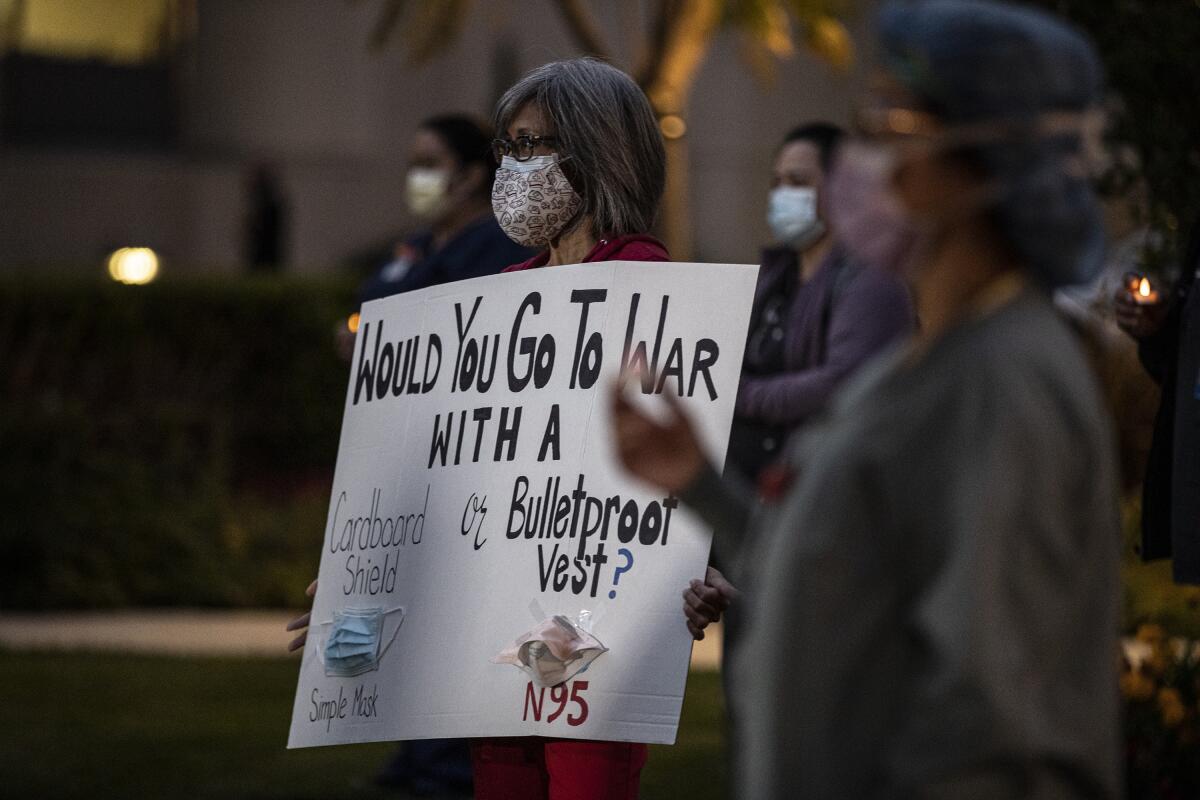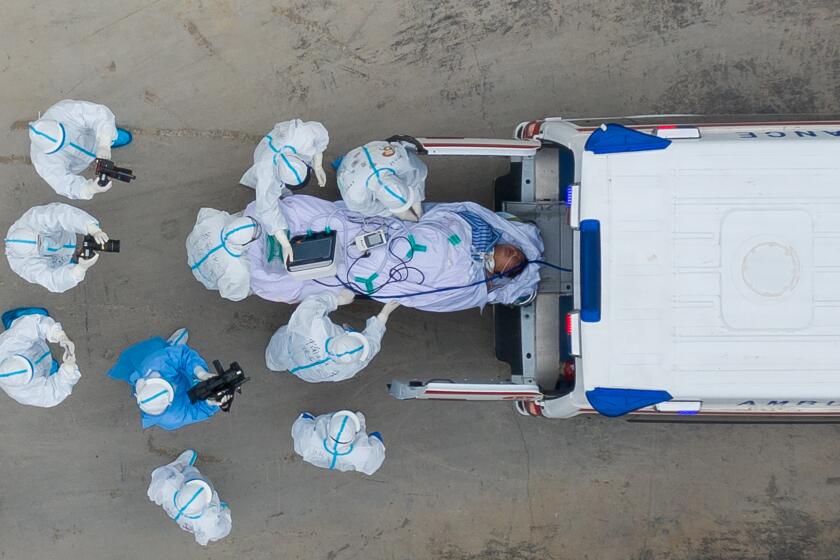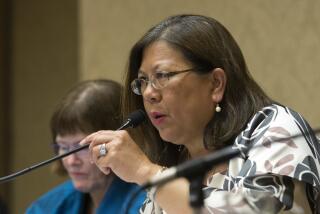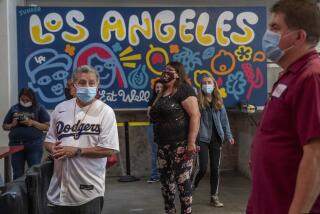Suppliers cash in as California taxpayers hit with wildly inflated prices for masks

- Share via
SACRAMENTO — State agencies — and ultimately California taxpayers — are paying steep prices for coveted masks that protect against the spread of the novel coronavirus as suppliers and middlemen cash in on the global shortage of medical equipment, according to a Times review of hundreds of state contracting records.
State officials are paying more than 300% above list prices as they navigate a marketplace rife with fraud and price gouging in search of millions of masks for healthcare workers, inmates and government employees deemed essential.
Last week, state transportation officials bought more than 1,400 masks at $12.74 each in what was described as an emergency purchase to ensure that road and maintenance workers were protected against the virus. The masks are N95 respirators made by the giant U.S. manufacturer 3M, according to the seller and purchase orders reviewed by The Times.
3M said it has not changed its prices, and the company’s highest suggested list price for common N95 models tops out at $3.40.
The state has little legal protection from price gouging even as authorities decry the practice. Gov. Gavin Newsom’s executive order this month banning large price hikes on medical gear exempts vendors willing to sell to the state or local governments.
A state spokeswoman said the exemption was necessary so California could buy medical supplies “regardless of price to protect public health,” but the loophole also means there is no limit on what vendors can charge the state.
Officials defend paying the steep prices, saying there is intense competition for masks and the top priority must be protecting state workers.
California Department of Transportation spokesman Matt Rocco said in a statement that the agency’s purchase of masks at more than $12 each was “based on immediate need for the health and safety of its employees. Considering the unprecedented demand and fluctuating circumstances, we are reviewing our processes to determine ways the department can streamline purchasing and obtain a reliable supply at a better cost.”
Government agencies are not alone. Companies and individuals are also paying inflated prices for various types of masks both at stores and street-corner vendors who have popped up in recent weeks.
Most state purchasing records reviewed by The Times made it difficult to determine exact pricing per mask, but in 10 cases, The Times found extraordinary markups on respirators, including on large bulk purchases.
Earlier this month, the healthcare provider at the Department of Corrections and Rehabilitation ordered 1 million KN95 respirators at $4.78 a mask, a price another supplier said was high. The California Department of Public Health ordered 100,000 masks at $4.60 each last week for a model that 3M says should not cost more than $1.88.
“Holy moly!” said John Thomas, co-founder of recently formed Blue Flame Medical, which sells personal protective equipment. “These agencies have a duty to obviously procure PPE, but also to get it at a fair market price.”
Where the markups are happening is difficult to pinpoint.
Thomas said it’s possible that sellers are pocketing only a slight markup but that with multiple middlemen involved in a single deal, the price ends up being astronomical.
Some sellers say the bulk of price hikes happens in China, where companies want a full payment before shipment. That leaves some middlemen assuming the risk of sending cash before inspecting the products. Another supplier said he was competing against rival companies — and even countries — that send envoys with bags of cash to bid for supplies.
For weeks, Trump downplayed the coronavirus as his administration delayed or bungled crucial early steps in its response. Even some top aides warned it posed a greater risk than the president claimed.
Brian Ferguson, spokesman for the Office of Emergency Services, said state officials have been compelled to make some high-priced purchases because there is no “reliable source of personal protective equipment.”
“Some of these prices the state is paying are not ideal, they are not what we would pay under typical circumstances,” Ferguson said.
Ferguson said state officials have been inundated with questionable offers to sell them masks, including a demand to pay up front in Bitcoin. More than 6,000 offers to sell equipment have poured in since the state launched a website, covid19supplies.ca.gov, on April 4 to help centralize the process, he said.
Before buying, he said, state officials must determine if the equipment meets government standards and whether the seller is reputable.
“Many offers are not legitimate or don’t meet the threshold for purchasing by the state,” Ferguson said.
State officials, he said, have reported at least one case of suspected fraud to the FBI.
Federal and local law enforcement officials have made a series of arrests related to fraud or price gouging mask deals. The Baldwin Park Police Department announced April 7 that it arrested a Covina man suspected of price gouging during an emergency, saying he was advertising to the public that he had 3M N95 masks for $15 each.
While there is no specific federal law against price gouging, a U.S. Department of Justice task force is using anti-hoarding laws to target suppliers suspected of demanding high prices for stashes of scarce protective equipment.
State officials say that California’s new partnership with a Chinese electric car manufacturer will ensure the state has a steady supply of masks. How much the state will pay for each mask, however, is unknown. The $1-billion deal Newsom announced with BYD has been shrouded in secrecy and is not expected to get masks to California until next month. That leaves the state continuing to scramble in the near term for what masks it can find.
Last month, the Department of General Services, which acts as the state’s business manager, ordered 4,800 masks for $8.25 each. 3M’s highest suggested list price for those masks is $1.88. State procurement data identifies the seller as SecondLifePhones, a company that public records say is run by Saqib Waqar of Los Angeles. Waqar declined to comment.
The department made a second purchase for 4,460 N95 masks from SecondLifePhones earlier this month for $8.25 per mask, but the state’s procurement data do not indicate the model. A department spokeswoman declined to comment or provide a purchase order for either sale.
The procurement data reviewed by The Times show the prison system has ordered millions of masks in recent weeks for its 46,000 staff, including healthcare workers, and 118,000 inmates.
As of Wednesday, 95 prison staffers and 135 inmates had tested positive for COVID-19. On Sunday, an inmate at the California Institution for Men in San Bernardino County became the first in the state to die from complications related to the virus.
Dana Simas, a corrections department spokeswoman, said the prison system is working “diligently to ensure our staff have the equipment necessary to protect the health and safety of all those who live and work in our state prisons.”
“We are exploring vendors at all levels — local, state, national and international — to help meet our supply needs at the best possible price available in line with local and global market pricing,” Simas said.
Simas said one company offered to sell KN95 masks for $13 each on a large order, which the department declined.
The KN95, a Chinese alternative that is supposed to match the gold standard of the N95’s filtration rate, is new to American healthcare supply chains, said Ryan Curtis, vice president at Boss Safety Products. Curtis said his company hasn’t significantly changed prices on N95 masks since before the pandemic, saying it was a matter of business ethics. But traditional sellers such as his company are sold out.
Timothy Devine, a retired Air Force lieutenant colonel who owns Aviate Enterprises, the company that sold the state 1 million KN95 masks for prison healthcare workers at $4.78 each, said his profit margin was between only 2% and 4%.
Chinese manufacturers have been able to hike prices because of the global demand, he said. While searching for masks to complete the order, one of his employees visited a manufacturer in Shanghai, where representatives of European countries were bidding for the same masks with duffel bags and suitcases full of euros, he said. Ultimately, the Aviate employee went to another supplier, he said.
Chinese manufacturers are able to “rake [American customers] over the coals right now,” said Diane Devine, the owner’s spouse, who also provides legal services to the Sacramento-area company.
Her husband said that while masks are usually transported by sea, the urgent need for the supplies in California required the company to airlift them, and the cost of air transport, already many times more expensive than sea transport, has nearly quadrupled since before the crisis. Raw materials have also gone up, he said.
And he said he has had to take additional security measures after hearing stories of trucks filled with masks being robbed on U.S. highways. He said he had another car he called a “chase vehicle” secretly tail the trucks carrying the masks to thwart any theft.
Any seller claiming it can provide the same masks at a much lower price is spouting “baloney,” Timothy Devine said.
On March 23, the corrections department bought 1,200 N95 masks at $9 each from AAA Wholesale Co. Inc., the procurement data show.
David Chang, AAA Wholesale’s president, said in an email that the South San Francisco-based company is charged $4 to $7 for each mask and must pay up front, then carry the shipping costs and wait 30 to 45 days before the state pays for an order.
“During the time they asked us for a bid, there was absolutely nothing on the marketplace, and I didn’t even know we’ll even get it, so we just threw in a price,” Chang said. “That one particular time we got lucky, and we did make a little money.”
His company’s website currently lists the price of the same masks as $49 for a box of 10 — roughly half the price paid by the state. He said wholesalers are frequently changing the amounts they charge.
Brennen Davis, whose companies Environmental Concepts and Pavement Preservation Specialties in Tehachapi sold 1,436 masks last week at $12.74 each to Caltrans, said he purchased them from an American 3M distributor chain located in the South.
Davis said he warned Caltrans that the asking price from his supplier was steep. The total was $18,300, according to state purchasing records. Davis said the per-mask charge included expedited shipping costs.
Davis declined to say how much he paid for the masks or the name of the supplier.
He said his company, which has a long history of selling asphalt, protective gear and other supplies to Caltrans, made less than 20% as the middleman. When pressed during an interview, he said the “true profit margins were around 15%.”
In a follow-up email, Davis said he looked into the details of the deal and the “profit margin is at 10%, excluding credit card fees and expedited shipping.”
“Our profit margins are our profit margins,” Davis said. “We weren’t price gouging at all.”
More to Read
Sign up for Essential California
The most important California stories and recommendations in your inbox every morning.
You may occasionally receive promotional content from the Los Angeles Times.












